November 25, 2025 | 01:29 GMT +7
November 25, 2025 | 01:29 GMT +7
Hotline: 0913.378.918
November 25, 2025 | 01:29 GMT +7
Hotline: 0913.378.918
More than ten years ago, Ms. Cao Thi Ten, Director of Phu Ngoc Agricultural Cooperative (Phu Ngoc commune, Dinh Quan district, Dong Nai), pioneered herbal chicken raising.
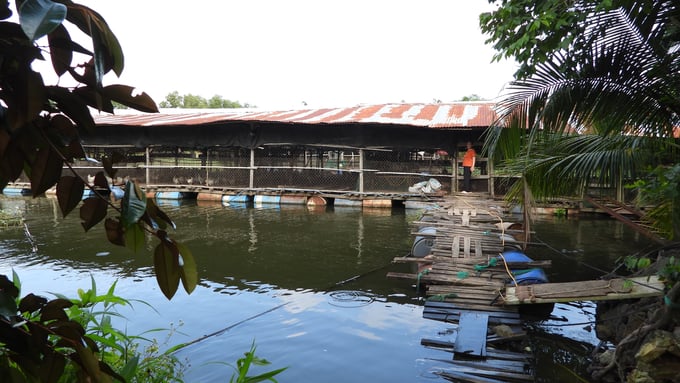
Ms. Cao Thi Ten’s biosafe herbal chicken farm. Photo: Tran Trung.
Following the staff of the Department of Agriculture and Rural Development of Dinh Quan district to visit Ms. Ten’s farm in Phu Ngoc commune, we were highly impressed because, despite her old age, Ms. Ten was still enthusiastic and steadfast in her direction of livestock farming. Using herbs, she says “no” to antibiotics, maintaining product quality.
Ms. Ten has raised chickens since the 1990s, including industrial and conventional chicken products. In 2011, for the first time, she participated in a workshop on herbal chicken farming organized by a leading food company. After that, Ms. Ten wanted to test this new product, so she adopted the first 100 chickens provided by this company and gradually mastered the process.
According to Ms. Ten, antibiotic use is a double-edged sword. If misused, it affects not only product quality but also farmers. She has come a long way in testing whether natural herbs can be used as an alternative to antibiotics to prevent and treat disease.
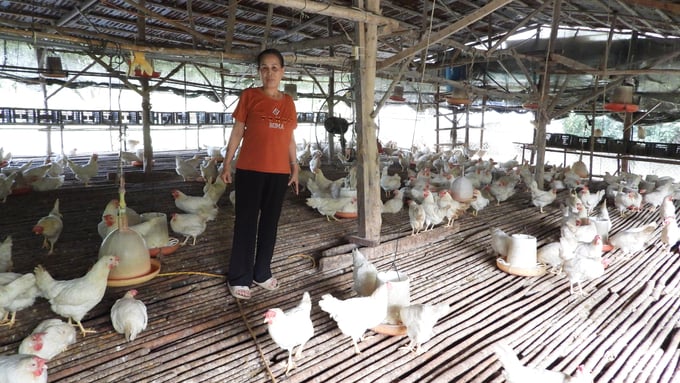
Thanks to herbal techniques, chickens are healthy and rarely susceptible to digestive diseases. The meat is nutritious, firm, sweet, fragrant, and low in fat. Photo: Tran Trung.
She uses ten types of herbs, mainly spices such as ginger, rosemary, basil, and turmeric mixed into chicken food. Natural medicinal substances in herbs have helped chickens avoid diseases such as flu or pasteurellosis without using antibiotics, minimizing antibiotic residues in processed chicken meat.
In addition, to meet standards, an elaborate chicken farming process is required. Herbal seed chickens are vaccinated according to strict regulations. From the second month, the chickens are fed food mixed with herbs and weigh 1.3 - 1.8kg/chicken, not heavier. The food source must ensure the correct ratio according to the herbal formula (powder form), meaning 5kg of herbs mixed with 1,000kg of food.
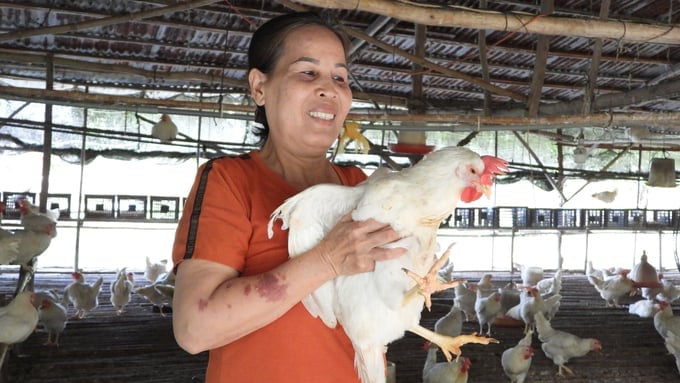
The demand for herbal chickens is high, so herbal chicken farmers do not have to worry about the lack of consumption. Photo: Tran Trung.
“Thanks to herbal techniques, chickens are healthy and rarely susceptible to digestive diseases. The meat is nutritious, firm, sweet, fragrant, and low in fat. The demand for herbal chickens is high, so herbal chicken farmers do not have to worry about the lack of consumption. Raising herbal chickens is not very profitable, but it will be profitable in the long run,” Ms. Ten shared.
The brand Cao Ten Herbal Chicken is no longer unfamiliar to consumers. To build a brand and find her own place, Ms. Ten had to go through ups and downs, overcoming difficulties and challenges.
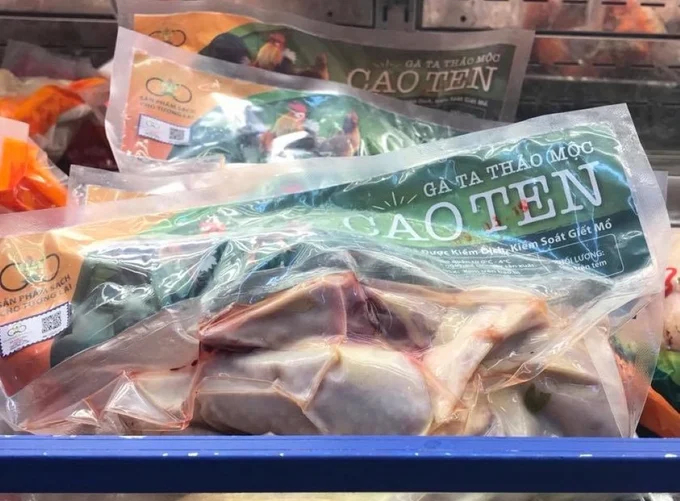
The brand Cao Ten Herbal Chicken is no longer unfamiliar to consumers. Photo: Tran Trung.
Up to now, product consumption has been very stable and favorable. Once, Ms. Ten’s herbal chicken farm reached 50,000 chickens, supplying the market with 250 - 350 chickens/day. The price of herbal chicken is always stable at a high level.
Sharing the lesson of developing a brand, Ms. Ten said that today there are many young people and farmers starting businesses with diverse models. However, no matter what the circumstances, she thinks everyone must maintain their enthusiasm for the work. When a farmer has enough passion and enthusiasm, the products he or she makes will meet the requirements.
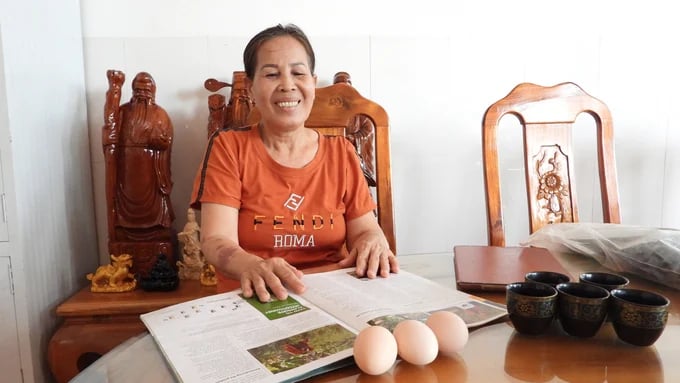
Ms. Ten excitedly shared her achievements of more than ten years of researching, applying techniques, and developing her herbal chicken brand. Photo: Tran Trung.
For a good brand, product quality and kindness to consumers must always come first. “Gaining trust from consumers is very difficult, retaining consumers to use your products regularly and for a long time is even more difficult,” Ms. Ten said.
In 2020, the herbal chicken products of Phu Ngoc Agricultural Cooperative were certified with 4-star OCOP. This is an important achievement after over ten years of building the brand. Currently, the cooperative has become a supplier of herbal chickens and eggs for the Saigon Co.op system. In addition, the cooperative has supplied herbal chickens and eggs to a number of organic food store systems in Bien Hoa (Dong Nai) and Ho Chi Minh City.
Translated by Quynh Chi

(VAN) The information was shared at the seminar 'Urban Agriculture - Solutions for Developing Green Spaces,' organized by the Kinh te & Do thi Newspaper and the Biotechnology Center of Ho Chi Minh City.
/2025/11/19/4141-2-132831_216.jpg)
(VAN) One of Japfa's outstanding solutions is implementing digital transformation and artificial intelligence (AI) to optimize operations, enhance productivity, and advance sustainable development.
/2025/11/19/4847-1-093540_448.jpg)
(VAN) The Gia Lai Provincial People’s Committee had a working session with the delegation of the U.S. Department of Agriculture, the State of Idaho, and representatives of the State's leading enterprises.

(VAN) Ca Mau has a sufficient foundation to become a strong regional aquaculture center, where production integrates the economy, the environment, and the lives of the people.

(VAN) SEIKI Group envisions itself as a pioneer in the ‘dual transformation’ of digital technology and green industry, standing alongside the Government and Vietnamese businesses in their pursuit of sustainable development.

(VAN) The VNGEONET network affirms Viet Nam's progress in mastering digital space, providing a precise positioning data platform to serve socioeconomic development.
/2025/11/14/3247-1-184556_35.jpg)
(VAN) Thai Nguyen is methodically implementing digital transformation in the livestock sector, laying the foundation for a modern, transparent, and sustainable agriculture.